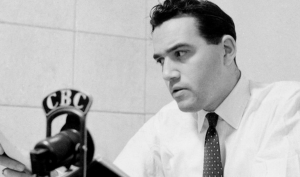
Upon close scrutiny, American and Canadian Baby Boomers (born 1946-1964) will probably recognize the man in the photo as a young version of Ben Cartwright — owner of the Ponderosa Ranch and a father to three sons. Not here in the U.S., but in Canada, previous generations — The Greatest Generation (born 1910-1924) and The Silent Generation (born 1925-1945) might be more likely to remember Lorne Greene as “The Voice of Doom” on the Canadian Broadcasting Corporation (CBC) radio. That’s not the title bestowed on him by the network, but that is how he was described by many of his listeners.
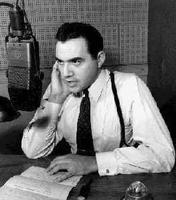 Canada has historically had close ties to Great Britain: It is a British Commonwealth country that was once part of the British Empire. Only one week after World War II began in 1939, our northern neighbor entered the war and sent aid, supplies and soldiers across the ocean to Great Britain. The U.S. was still on the sidelines at the time, not an active participant in the war until the attack on Pearl Harbor in 1941.
Canada has historically had close ties to Great Britain: It is a British Commonwealth country that was once part of the British Empire. Only one week after World War II began in 1939, our northern neighbor entered the war and sent aid, supplies and soldiers across the ocean to Great Britain. The U.S. was still on the sidelines at the time, not an active participant in the war until the attack on Pearl Harbor in 1941.
From 1939 until 1942, Lorne Greene was the principal newsreader on the CBC nightly national news — heard across Canada from Vancouver, BC to Yellow Knife, NT to Gander, NL. In the early years of the war almost everything went poorly for Great Britain and its allies. The dire news from the front, reported on a nightly basis in Greene’s baritone voice, was so alarming (battles lost, defenses crumbling, strategic disasters, capitulating allies, and Canadian fatalities) that his fellow countrymen referred to him as “The Voice of Doom.”

Lorne Greene news anchor CBC Radio, May 6, 1943 (things were going better for the allies by then) Run Time 5:24

Greene was born in Ottawa, Ontario in 1915. His birth name was Lyon Himan Green. As you can see, his real first name was not Lorne and his original last name lacked an ‘e’ at the end. Greene’s parents hoped he would become a concert violinist, but that goal was not part of his plan. As a student at Queen’s University in Ontario, Greene studied chemical engineering. Before long he decided to study language arts, which gave him more time to focus on acting, directing and drama. Even in high school Greene had a deep, pleasant but powerful speaking voice. At University, in addition to pursuing theater, young Lorne worked on-air shifts at campus radio station CFRC.

In 1937, after university, Greene enrolled at the prestigious Neighborhood Playhouse School of the Theater in New York. Upon completing that program in 1939, he returned to Canada. Acting jobs were scarce to begin with, but when the war broke out it was nearly impossible to break into acting in Canada.
Since Greene needed to find work, he auditioned for the CBC. The radio network hired him as an announcer. And, with Greene’s ability and drive, it wasn’t long before he was Canada’s most prominent newscaster. The CBC advertised Lorne Greene as “The Voice of Canada.” Perhaps it was gallows humor on the part of listeners but, as mentioned previously, the grim war news Greene reported on a nightly basis led to the moniker “The Voice of Doom.”
During Greene’s time at CBC, he narrated several newsreels, shorts, features, propaganda films and documentaries about the war. These were produced by the National Film Board of Canada and private production companies. Of the releases Greene narrated, probably the most notable was Churchill’s Island. In 1941, it won the first ever Academy Award for a Documentary Short Subject Film. Watch the Oscar winning short by clicking here (Run Time 21:24)

In 1942, Greene left the CBC for three years to serve the war effort as a flying officer in the Canadian Royal Air Force. As the war was ending in 1945, Greene resumed his career at CBC, also he narrated films and did freelance voice work. Greene was heard on three popular radio shows: Canadian Cavalcade, Curtain Time and Peerless Parade. Meanwhile, in Toronto he founded the Lorne Greene Academy of Radio Arts and a repertory group called the Jupiter Theater. Beginning in 1950, and continuing for three years, Greene hosted a news magazine for CBC. But it wasn’t a radio show, the program was broadcast on CBC television. As a side note, Greene is credited with inventing a stopwatch that ran backwards (so newscasters could tell how much time they had left when reading news copy on-air).
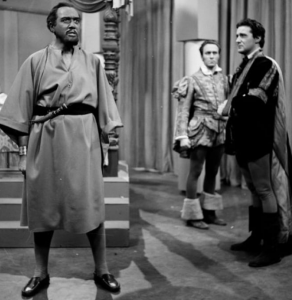
In 1953, Greene relocated to the U.S, where he chose to concentrate on a theatrical career and not radio broadcasting. Initially, he landed smaller acting gigs on stage in New York. Greene participated in perhaps North America’s premier Shakespearean theater arts festivals at Stratford in Ontario. As his acting career was taking off, Greene appeared in Broadway shows and he took bit parts in early TV shows.
Greene’s big break came after an appearance on the popular western series Wagon Train. Influential professionals were impressed and they offered him a leading role in an upcoming western that would be called Bonanza. The show debuted in 1959 and Lorne Greene played Ben Cartwright, father of Adam, Hoss, and Little Joe. Bonanza was a smashing success. Among the show’s many laurels, it became the first one-hour western series to be filmed in living color. In 2004, TV Guide ranked Ben Cartwright as #2 of all time on their list of the “50 Greatest TV Dads of All Time.” You can relive the early days of Bonanza, at least the show intro, the theme music, and the four Cartwrights riding in on their horses, by clicking on the YouTube video below.
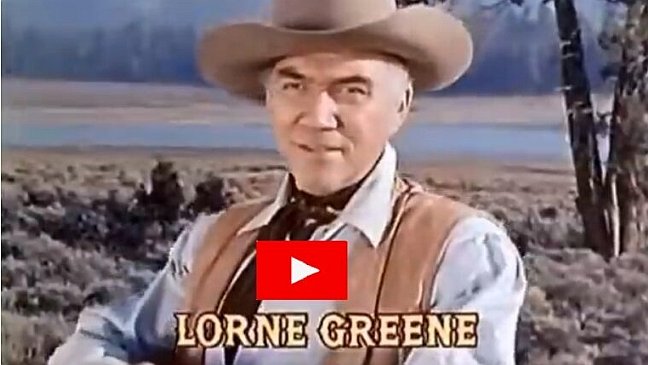
In the ‘60s, Greene’s starring role on Bonanza led to a brief but successful recording career. His releases were cowboy, gunslinger and western themed with more emphasis on spoken word than singing. The best known of Greene’s records was Ringo. It climbed to #1 on the U.S. Billboard chart in December 1964. Videos of Greene performing his hit are scarce. However, he made such an appearance on the Allan Sherman show on January 19, 1965. Catch that rare performance at the Vimeo video channel (click below).

After 14 years, in 1973, Bonanza was abruptly canceled. Although his stardom never again reached the glory of the Bonanza era, Greene appeared on a number of 1970s TV shows. He was well-fitted to his role in Battlestar Galactica.

Lorne also played a cop turned private eye in Griff. And he was John Reynolds, the first master of Kunta Kinte, in the acclaimed miniseries Roots. For nearly a decade, back in the sixties and seventies, Greene and Betty White hosted the annual Macy’s Thanksgiving Day Parade for NBC-TV.
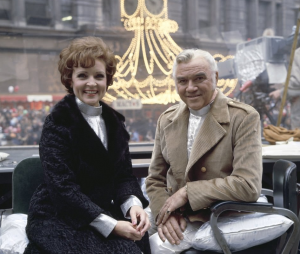

Greene had a few roles on the big screen as well, including the universally panned 1970s disaster flick Earthquake. In the ‘80s, back on the tube, he was once again cast in a father role, and concurrently as an L.A. Fire Department battalion chief, in Code Red. Meanwhile, Lorne Greene’s New Wilderness had a four year run in his native Canada.
Greene unexpectedly passed away in Santa Monica, CA in 1987 at 72-years-of-age. The cause of death was complications due to post surgery pneumonia. He had been married twice. Often cast as a father on television, in real life he fathered three children. To those of us who grew up in the 1950s and ’60s, Lorne Greene was a big part of our television viewing lives.
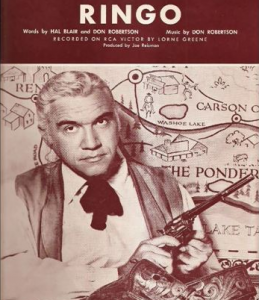
To read about pioneering CBS network WW II correspondent Eric Sevareid, click HERE.
Story credit, photos and archival materials, thanks to David Lennick (formerly with CBC), the CBC Archives and the National Film Board of Canada.
November 3, 2022 at QZVX
Steven Smith says:
Louis, I do not remember that far back either. I do have Canuck relatives of an age to recall the nickname. To recall it you would have to have been around and old enough to know what was going on in 1939 and early 1940s. He got the name because of all the bad news for the allies in the early days of WW2. And he was the national news anchor on CBC.
November 3, 2022 at QZVX
Steven Smith says:
Louis…I do not remember that far back either. I do have Canuck relatives of an age to recall the nickname. To recall it you would have to have been around and old enough to know what was going on in 1939 and early 1940s. He bot the name because of all the bad news for the allies in the early days of WW2. And he was the national anchor on CBC.
November 3, 2022 at QZVX
louis says:
Maybe I’m a youngin’ as I don’t remember the “Voice of Doom” thing. I did know he was a Canadian however.
I also remember that almost every female that was involved with a Cartwright ended up dead.
November 3, 2022 at QZVX
Jason Remington says:
Louis, you got that right. The mothers of the Cartwright boys died off. Life was tough on the women. At least one died giving birth.
November 3, 2022 at QZVX
Steven Smith says:
The original post on Lorne I wrote several years ago. But in updating some media tracks I discovered his TV performance of Ringo had become available. I cleaned it up a bit, the color and sound, and reposted the blog. It had always been one that gets quite consistent hits due to his celebrity and radio background.
November 2, 2022 at QZVX
Jason Remington says:
Lorne Greene’s album, Welcome To The Ponderosa, was among our collection of vinyl. Ringo was probably the only hit from the album. One cut I liked was called Sand. There is a tune listed as Alamo, which prompted me to recall Johnny Cash’s Remember The Alamo — I hadn’t heard it in years. It was on another album in our family’s collection… https://www.youtube.com/watch?v=l4FOgKC-g9U
January 17, 2021 at QZVX
tim mellin says:
I was music director at KBND in Bend, Oregon in 1973, and I added his “The Man” album to the playlist. I especially liked his “Destiny” song on said album.